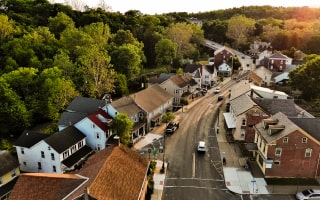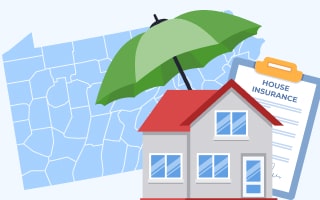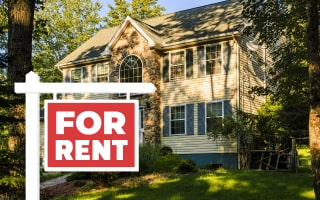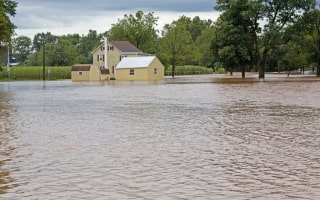Homeowners Insurance in Pennsylvania

Pennsylvania is a large state with almost 13 million residents. That means a lot of property and homes that need insurance. In some cases, insurance may be considered a waste of money, but homeowners insurance is vital protection for your home. Located in the Mid-Atlantic, Pennsylvania is subject to various types of weather disasters, such as hurricanes and severe winter storms. Since 1953, Pennsylvania had 59 federally declared disasters, and the number of disasters per 1 million people is 4.56.
Along with claims for damage caused by windstorms and severe winter storms, Pennsylvania residents also file homeowners insurance claims for water damage caused by burst pipes and faulty plumbing, animal bites, broken limbs and fallen trees, fires, liability, and other types of property damage.
Pennsylvania and the local government do not legally require homeowners to carry insurance. However, if you apply for a mortgage to buy your property, your lender will require you to secure and keep homeowners insurance for the life of the loan. The lender must protect themselves from loss if anything happens to the home, so they get to determine your coverage limits.
As of October 2024, the national average for homeowners insurance is $2,728 a year or $227 monthly. Pennsylvania property owners pay an average of $1,575 annually, which is still lower than the national average.
Types of Homeowner Insurance Coverage Available in Pennsylvania
Pennsylvania homeowners insurance protects lenders and homeowners if anything happens to their home to damage or destroy it. A homeowners policy covers specific perils that cause harm, such as fires, windstorms, electrical issues, and other disasters. Each policy covers different things but has certain limitations. The types available in Pennsylvania include:
-
Dwelling Coverage: This part of the policy agrees to repair or replace the main dwelling (structure). Most homes are covered between 80% and 100% of the replacement cost.
-
Personal Property Coverage: Personal property coverage protects the contents of your home, such as furniture, clothing, art, and jewelry. Typically, this coverage is roughly 50% of your dwelling coverage. It pays to fix or replace items that are stolen or damaged.
-
Other Structures: The coverage of other structures refers to detached items like pools, hot tubs, fences, sheds, and garages.
-
Guest Medical: If someone is injured on your property, this pays their medical bills.
-
Liability Coverage: Liability insurance protects you when someone sustains bodily injury or property damage caused by you. Most coverage is limited to $100,000, which may not be enough to cover a lawsuit against you. You are advised to increase this limit.
-
Additional Living Expenses (ALE) Coverage: Additional living expenses insurance is for when you are displaced from your home due to damage or destruction. It covers the extra living expenses you incur while forced to live elsewhere until you can return to your home. ALE pays for hotels, meals, laundry service, pet boarding, and storage.
Consider purchasing an umbrella policy that covers anything the other coverages do not. This policy provides a safety net to ensure you can restore your property to its original state.
Generally, insurance carriers do not provide insurance for flooding, earthquakes, or tornados. You can sometimes purchase special insurance to cover them, but only rare providers offer it. Even though hurricanes are rare, it is good to have them when your house is damaged due to rain, high winds, and other natural disasters.
FEMA (Federal Emergency Management Agency) manages the National Flood Insurance Program (NFIP) through a network of 50 providers across the U.S. Since most homeowners insurance does not cover floods, this supplemental coverage can repair damage and replace items after a flood. Depending on your options, it can cover the building and/or your personal belongings. This program is available to homeowners, renters, and businesses. Learn more about the program on FEMA's website.
Home Insurance and Natural Disasters
Global warming drastically affects the world's weather and the home insurance industry. Severe climate change and frequent storms are causing massive damage, high claims, and insurer losses. As a result, over the past five years, rates have increased by 34% and, in some areas, 60%. Pennsylvania's rates have increased by 16.9%, far less than the national average. Climate change is the number one driver for rate increases in the U.S.
Pennsylvania's most prominent natural disasters are hurricanes and heavy winter storms. A single hail or windstorm costs insurers an average of $11,695 per claim. Fire damage costs an average of $77,340 per incident, and water, snow, ice, and freezing damage costs an average of $11,650. From 2015 to 2019, Pennsylvania insurance providers lost a total of $1,568,408,800. In 2021, Pennsylvania ranked 6th highest state for lightning claims, with 2,410 costing insurance companies $34,000,000. The state also made the list of the states with the most dog bites in 2021, with a total of 777 at an average claim of $47,353. From 1980 to 2024, Pennsylvania had 107 billion-dollar disasters.
How Can I Save on Homeowner Insurance Premiums in Pennsylvania?
Although premiums haven't risen to astronomical heights in Pennsylvania, residents still want to save wherever possible. Learning what factors impact home insurance can help.
-
Location: The location of your home matters tremendously. If you live in an area prone to disastrous weather or high crime, you will pay more.
-
Size & Condition of the Home: Size and condition also come into play. The larger your home, the more you will pay. If the house is well-maintained, you will pay less than if it is in disrepair.
-
Age of the Home: The newer the home, the lower your premiums will be.
-
Level of Coverage: The more coverage you purchase, the higher your premiums.
-
Deductible: The larger the deductible, the lower the rates. Balance as high a deductible as possible with the coverage you need.
-
Your Credit Score: People with good credit scores earn lower rates than those with poor credit.
-
Claims History: If you have a lot of claims, even small ones, you will pay more as the insurer will see you as a high risk.
-
Additional Risks: If you have fireplaces, pools, or a hot tub, you will pay more for these "attractive nuisances".
To save on homeowners insurance, follow these tips:
- Ask for Discounts: Ask your provider for any additional discounts you might be eligible for.
- Improve Your Credit: Improve your credit score and ask your insurer to reassess your rates.
- Shop Around for Rates: Shop around and find the lowest rates possible.
- Reinforce Your Roof/Siding: Installing shatterproof windows, reinforcing your roof, or installing storm shutters could make your house more disaster-resistant and save you money on home insurance. Also, consider upgrading plumbing and electrical systems to avoid water damage or fires and reduce claims and rates.
- Bundle Insurances: Combine your home and auto insurance with the same carrier to save money on your insurance.
- Increase Your Deductible: Increase your deductible for lower rates.
- Sparingly File Claims: Do not file any claims unless absolutely necessary. The more claims you file, the higher your rates will be.
- Install Security or Safety: Install a top-notch security system to keep your house safer and lower rates. Install fire extinguishers, smoke alarms, and sprinklers to reduce your risk of fire and lower rates.
Home Insurance Discounts in Pennsylvania
Home insurance protects you financially in the case of a disaster. After a covered peril, the insurance company will pay to replace or repair your home and restore it to its previous condition. Some covered perils are windstorms, fire, theft, and vandalism. Most policies also include other structures, personal property coverage, liability, medical payments, and loss of use. Something to keep in mind is replacement cost vs. actual cash value. When purchasing homeowners insurance, opting for replacement cost rather than actual cash value is crucial. Replacement cost will replace your home and restore it back to perfect condition. Actual cash value is the value of your home, less wear and tear, and age. Therefore, if something happens to your home, your insurance may not pay enough to replace it.
You can obtain a policy quickly. Do some research, find a company you feel good about, and then contact them via phone or online. You can also find a local agent to work with who will help you determine your coverage needs and budget. You must pay the first year in advance, and then after that, you can pay monthly through your mortgage escrow or once a year.
The most common discounts offered by most reputable insurers include:
- Senior Discount: People of a certain age often get discounts from their insurance providers.
- Military Discount: Most firms will offer discounted rates for active military personnel and veterans.
- Occupational Discount: Some occupations, like teachers, firefighters, and government workers, earn insurance discounts.
- Bundling Discount: Most firms will discount your premiums when you bundle multiple policies together.
- Claims-Free Discount: Stay claims-free as long as possible and earn ongoing discounts through your insurance carrier.
- Loyalty Discount: Remain a loyal customer; your insurance provider may discount your rates more each year.
- Quote in Advance Discount: Get a quote long before you need it, and you can earn a discount.
- Paperless Discount: Go paperless for statements, and you will get a small discount.
- Autopay Discount: Many firms also offer small discounts for people who sign up for autopayments.
- Fire Safety Discount: Install fire safety features in your home, such as smoke alarms, sprinklers, and fire extinguishers, to lower your fire risk and earn discounts.
- New Home Discount: Newer homes earn up to 40% off home insurance.
Common Rates Offer by Homeowners Insurance Firms
New construction homes cost a lot less to insure than older homes. That is because they are constructed using code-compliant, fire-retardant materials, which are easily replaced. Sometimes, you can spend up to 40% less on new home insurance and up to 26% less if your home is five years old or younger. Pennsylvania homeowners average $884, considerably less than the average for older homes. Your actual cost will vary depending on your chosen company, claims history, credit score, age, and other factors.
Top 10 Home Insurance Firms in Pennsylvania and Average New Home Savings
| Company | % savings |
|---|---|
| Nationwide | 76% |
| USAA | 54% |
| Chubb | N/A |
| Farmers | N/A |
| Allstate | 47% |
| Lemonade | N/A |
| State Farm | 51% |
| Amica Mutual Insurance | N/A |
| Liberty Mutual | N/A |
| Erie | 51% |
Home Insurance and Renovations in Pennsylvania

Home renovations can enhance a home's beauty and make the space more livable, but they can also impact its insurance. Some upgrades increase your home insurance rates by adding value or risk; other renovations lower them. Some have no effect at all.
![]() Home Renovations that Increase Rates
Home Renovations that Increase Rates
Some home renovations that increase your rates include:
- Solar Panels: Solar panels are a great way to save money on electricity, but they are expensive to replace, so your home insurance premiums will increase.
- Adding a Pond: A pond can add serenity to your property, but it is a risk and will also increase your home insurance rates.
- Building a Treehouse: Treehouses give the kids hours of fun, but insurers say they are an attractive nuisance, and you will get hit with higher rates because of it.
![]() Home Renovations that Decrease Rates
Home Renovations that Decrease Rates
Some home renovations that decrease your rates include:
- Update the Infrastructure: Updating your home's infrastructure (foundation, roof, wiring, plumbing, and HVAC systems) can strengthen your home and make it safer and more valuable. Being proactive will also lower your rates.
- Earthquake Resistance Retrofits: Anyone who lives in an earthquake-prone area should reinforce their home with straps, ties, and shatterproof windows. Insurers also reward you with money off your premiums.
- Water Alarms and Auto Shut-Off Devices: Water damage is expensive. You can avoid this costly peril by installing automatic water shut-off devices and alarms and lowering your home insurance rates.
Installing new siding can help your house withstand severe weather better and could lower your rates, but if you use luxury materials, your rates could go up or cancel out any savings.
Elective repairs and maintenance are not covered under homeowners insurance. It only pays to replace or repair your home after a qualifying event. Other things not covered are mold, fungus, wear and tear damage, rot, seepage, pollutants, pest infestations, rodents, animal damage, and sewer backups.
Whenever you have any major work done on the house, contact your agent and report it to increase the value/coverage of your property. They can help you decide if any changes are necessary.
Pennsylvania Renters' Insurance

Renters insurance is like homeowners insurance for renters, apartments, and condos. Unlike home insurance, it has no dwelling coverage (the owner's policy covers that). A typical renters policy covers personal property, liability, and additional living expenses. However, there are limits, and it will only cover a certain amount. If you have expensive art, jewelry, and electronics, you may be unable to claim the total amount to replace them.
Some covered perils include:
-
Smoke
-
Fire
-
Windstorms
-
Hail
-
Theft
-
Vandalism
Some of the items that renters insurance covers are:
-
Small Appliances
-
Furniture
-
Clothing
-
Bedding
-
Bath Items
-
Electronics
-
Sporting Equipment
Renters insurance is priced according to three main factors, and they are:
-
Location: Even as a renter, your location matters. If you live in the city, you will pay more than if you live in the country. If your area has many weather events, you will pay higher rates.
-
Coverage Amount: The more coverage you buy, the higher your premiums.
-
Number of Units: The more units in your building, the lower your rates.
A typical renter in Pennsylvania pays around $124 a year or $10 a month, which is considerably less than the national average of $15-$20 a month.
Condo Insurance in Pennsylvania

Homeowners and condo insurance are similar but with one huge difference. The dwelling coverage in homeowners pays to replace or repair your home after an event. With condo insurance, the insurer will only pay to repair or replace the interior of your home. This is called "walls-in" coverage. The condo association's master policy covers the building and all exterior features. However, it will only restore your condo back to its original condition. Many owners upgrade flooring, appliances, fixtures, and other items, and they need condo insurance (HO-6 coverage) to bring the interior back to its present condition. Condo insurance also includes personal property, liability, medical payments, loss of use, and loss assessment.
Renters insurance doesn't cover dwellings (that is covered under the owner's policy), and although condo insurance does, it's limited to only "walls"-in". Plus, your liability insurance will only cover someone who is injured within your condo, not outside.
Condo insurance covers the following items:
- Interior Walls
- Wiring and Plumbing
- Appliances
- Furniture
- Carpets & Other Flooring
- Light Fixtures
- Countertops
- All Other Personal Possessions
The average rate for condo insurance in Pennsylvania is $657/year or $55/month, which is close to the national average of $625/year for $60,000 of personal property, $300,000 of liability, and a $1,000 deductible.
Some ways to save on condo insurance in Pennsylvania are:
- Shop Around and Compare Prices
- Bundle Your Home and Auto Together
- Increase Your Deductible
- Look for Other Discounts
- Install Safety Features
- Upgrade Your Home with a Security System
- Keep Your Credit Score High
- Avoid Small Claims
Pennsylvania Home Insurance Market
Although the weather in Pennsylvania is not extreme, rates have risen steadily, and insurance providers' profits have dwindled since 2013. Homeowners insurance losses have also doubled during that same period. As global warming continues and these trends prevail, we should see a further decline in profits and more losses each year, slimming competition within the state as some providers pull out and stop offering coverage or limiting options.
Hurricanes and severe winter storms impact the state tremendously. As they become more frequent and more devastating, claims will pile up, and insurance providers will take action. Rates will continue to rise; eventually, residents may have trouble finding or affording coverage.
Each state regulates the home insurance industry individually. The Pennsylvania Insurance Department, located at 1321 Strawberry Square, 13th Floor, Harrisburg, PA 17120, is the government agency in charge of all insurance-related matters for the state. It oversees providers operating within its borders, monitors rates, investigates customer complaints, and sanctions guilty firms.
Homeowners Insurance Guide
- Homeowners Insurance in Pennsylvania
- Types of Homeowner Insurance Coverage Available in Pennsylvania
- Home Insurance and Natural Disasters
- How Can I Save on Homeowner Insurance Premiums in Pennsylvania?
- Home Insurance Discounts in Pennsylvania
- Home Insurance and Renovations in Pennsylvania
- Pennsylvania Renters' Insurance
- Condo Insurance in Pennsylvania
- Pennsylvania Home Insurance Market
Instant Access to Pennsylvania Property Records
- Owner(s)
- Deed Records
- Loans & Liens
- Values
- Taxes
- Building Permits
- Purchase History
- Property Details
- And More!
Homeowners Insurance Guide
- Homeowners Insurance in Pennsylvania
- Types of Homeowner Insurance Coverage Available in Pennsylvania
- Home Insurance and Natural Disasters
- How Can I Save on Homeowner Insurance Premiums in Pennsylvania?
- Home Insurance Discounts in Pennsylvania
- Home Insurance and Renovations in Pennsylvania
- Pennsylvania Renters' Insurance
- Condo Insurance in Pennsylvania
- Pennsylvania Home Insurance Market